Daniel Sherrier's Blog, page 46
March 1, 2015
“Blaming Bloman”
Free short story time! Here’s “Blaming Bloman,” which was first published in the premiere issue of Beyond Imagination Digital Literary Magazine (it’s permanently free on Amazon, FYI). This story was adapted from a short play I wrote in college, “Blaming Beckett,” which technically can never be performed (but that didn’t stop us in college).
Copyright 2014 Daniel R. Sherrier
“Blaming Bloman”
By Daniel Sherrier
The stage directions were clear.
Bathe the minimalist set in pink lights. Position character ‘A’ in a garbage can. ‘A’ must stand in the receptacle and raise her left arm at an eighty-point-four degree angle. The garbage can will be gray, will not exceed one-point-zero-three meters in height, and will under no circumstances surpass one-point-ninety-seven meters in circumference.
Position character ‘B’ upside-down in a second garbage can of identical dimensions, situated zero-point-two meters stage-right of ‘A’ and not one decimeter further. His legs will point forty-five degrees in opposite directions, forming a V.
‘A’ will face character ‘C,’ who will stand two-point-seven meters stage-left of ‘A’ and behind a branch measuring one-point-two meters in length. The branch must have two leaves still attached. No garbage can, but it is absolutely imperative that he wear a brown paper bag over his face. ‘C’ is not to breathe.
H. Bartholomew Bloman decreed all this and more in his latest masterpiece, “Shrug: A Play in One Act?”
The cast and crew followed the script to the greatest extent possible while staging the show’s world premiere at an off-Broadway establishment. Several states off. Three would-be accomplished actors now gave life to ‘A,’ ‘B,’ and ‘C’ on a creaky proscenium stage before an audience numbering in the tens. Lower tens. The box office sold twenty-seven tickets, and twenty-one patrons showed up for the eight o’clock curtain.
Bloman always hated dialogue, so “Shrug: A Play in One Act?” features none of that distracting chatter. Thus, the cast was not miked in the acoustically challenged theater wedged between a twenty-four-hour gym and fast food restaurant, so two of them were free to speak their minds.
“Bart Bloman can kiss my ass,” ‘B’ said from the depths of his garbage can. Well, ‘B’ didn’t say that. The script denied ‘B’ any permission to say anything, but the young actor with perfectly coifed hair considered himself under no such obligation as the residual odor of long-departed trash slithered into his nostrils.
“Don’t insult the playwright,” the actress portraying ‘A’ muttered. She rendered her face nearly inscrutable, per Bloman’s instructions, though her infectious wonderment threatened to burst forth from her wide eyes as she watched the finely crafted personification of ‘C.’
The actor beneath the paper bag was not free to speak. He was not even free to breathe. He was, however, required to shrug right this second, so he did.
‘B’ noticed a blue tint forming at the base of his garbage can—the first of the incomprehensibly important light cues.
“Playwright?” he said. “How is he a playwright? How is this a play?”
‘A,’ ever an unpaid pro, flattened her burgeoning smile. “It’s a work of art.”
“Yeah, sticking two people in trash cans is just so artistic.”
“Don’t forget ‘C.’”
The lights turned to red. ‘C’ shrugged, though ‘B’ missed it due to his unfortunate vantage point.
“Oh, yes. ‘C.’ How could I forget good old ‘C’ standing there shrugging his shoulders at random intervals? Oh, such pathos…”
‘C’ shrugged twice more. Each new shrug was a flawless replica of its predecessor.
‘A’ would not stand by and let a fellow actor mock Bloman’s brilliance. She’d stand there because Bloman told her to, but Bloman did not explicitly forbid her from pushing words through her clenched teeth to defend his honor. “It’s supposed to represent the uncertainty of humanity at this crucial point in history when—”
“I don’t want to hear it. That’s it. I’m getting out of this damn trash can.”
“You can’t get out. It’s not in the stage directions.”
“So I’m improvising.”
“You can’t improvise.”
The lights turned to green, and it meant something.
“That’s right. Bloman’ll sue my ass off if I mess up his precious stage directions. Bloman can go to hell.”
“Just accept it. You’re upside-down in the can until the play is over.”
“I feel light-headed. Did someone try to bleach this thing?”
“It’s only a one-act. Kind of.”
“Is it? Your arm has to be getting tired.”
‘A’ refused to complain about discomfort in pursuit of art. She focused on ‘C’ as he shrugged beneath the purple lights. Ah, purple. Bold choice, Bloman. Bold choice.
“I’m sure no one would notice if you shook out your arm real quick,” ‘B’ said.
“I can’t.”
“You can.”
She took care not to raise her voice, lest she spoil the illusion for the twenty-one patrons in attendance. “In a few moments, I lower my hand to waist-level for precisely two-point-four seconds and then raise it back up at an eighty-three degree angle. I can wait until then.”
“Chicken. Bok bok bok.”
“Stop clucking. They might hear, and that’s an inappropriate juxtaposition. I don’t see you hopping out of your garbage can, now do I?”
“Somehow, this has gotten oddly comfortable.”
“Sure it has.”
“Or maybe it’s the fumes. Someone used a lot of something in here. And yet still not enough.”
The script called for ‘A’ to cough at this very moment while awash with this specific hue. So she coughed.
“Sounded like tough acting there,” ‘B’ said.
Bloman’s peerless intellect knew of only one way to follow up such a cough. The lights switched to yellow.
“I had to make sure the cough was delivered at just the precise pitch and volume so as to convey the sense that—”
“How’s it going, ‘C’?”
‘C’ did not respond, but that did not deter ‘B.’
“Hey, man. How’s life in a bag?”
“Wait for it,” ‘A’ said.
“What the hell is he doing over there?” ‘B’ asked.
“Standing perfectly still. In character.”
“I don’t get that guy or his ‘character.’”
‘C’ shrugged. ‘A’ almost erred by grinning, but she caught herself. “There you go. He shrugged his shoulders.”
“How shocking.”
“The yellow really highlights the shrug. Isn’t this fascinating?”
“Maybe it’s all the blood rushing to my head, but no. It’s not. Not even a little.”
‘A’ basked in the orange lighting now saturating the stage. “Bloman is a genius.”
“I can’t see a damn thing.”
‘A’ lowered her hand to waist-level for two-point-four seconds, brought it up, and held it at an eighty-three degree angle.
“Ahh…That felt nice,” she said.
“What was nice?”
“I lowered my arm.”
“With Bloman’s blessing, I’m sure.”
“Of course. I wouldn’t want to mess up his play.”
“This isn’t a play. We’re not doing anything.”
“I did something. I moved my arm.”
His legs stiffened. “How impressive.”
‘C’ shrugged.
“You missed another shrug,” ‘A’ said. “Each one’s better than the last.”
“They’re all the same.”
“No, you see, they’re all occurring in different color lighting, so each shrug has its own unique personality because of the way the light—”
“Don’t make me kick you.”
“You can’t kick me. It’s not in the stage directions. Now lower your voice.”
“Then I’ll add my own stage directions at the end of the play.”
“And afterwards you can face the wrath of Bloman.”
Lawyers usually accompanied Bloman’s wrath. They were his parents’ lawyers, but still. “Dammit.”
“Don’t mess with Bloman. He’ll get you.”
The lights transitioned to a perfect shade of brown. ‘B’ grew drowsy, though the lingering, noxious traces of refuse prevented any peaceful slumber, leaving him merely restless.
“So what are you doing after this ‘performance’?” he asked.
“I don’t know. Probably going home and watching TV. You?”
‘C’ shrugged.
“TV sounds about right, maybe a beer,” ‘B’ said. “What about you, ‘C’?”
“Your timing was a little off,” ‘A’ said.
“He’s no fun.”
“We’re not here to have fun. We’re here to give life to a great work of art,” ‘A’ said.
“Oh, excuse me.”
“You’re excused.”
‘B’ drew out a long breath. “Are we almost done with this?”
“I still need to lower my arm that second time.”
“People can’t possibly still be watching this.”
“I don’t know. My head can’t be turned directly at the audience.”
“What about ‘C’? He suffocate yet?”
“No, he’s hanging in there. I think. He’s standing. That’s a good sign.”
“What if he passed out? Wouldn’t that ruin everything?”
Golden lights replaced the brown in what Bloman considered a feat of sublime symbolism.
“That won’t happen,” ‘A’ said. “He put too much work into the role.”
‘B’ felt his arms going to sleep. “We should do something different.”
“No,” she hissed.
“Bloman’s not even in the audience. He’s working a shift at the bar. He’ll never know.”
“He will know. He’s Bloman.”
‘C’ bent his knees and reached straight down to pick up the branch. He held it in his right hand for four-point-five seconds before setting it seven centimeters to the left of its original location, and he rose back into his default stance.
“Amazing,” ‘A’ said.
“What?”
“He picked up the branch.”
“Oh. Does that mean we’re almost done? I’m losing feeling in my legs. And my head.”
“Um, well…Wait, hold on. Need to focus…”
‘A’ lowered her hand to waist-level for two-point-four seconds, brought it up, and held it at an eighty-three degree angle.
“Sorry, didn’t want to mess that up,” she said. “Anyway, you did actually read to the end of the script, right?”
“Stopped reading when I realized I had no cues,” ‘B’ said. “I am so ready for a new script. No more Bloman plays.”
‘C’ breathed for two seconds. Pink lights bathed the stage.
“So you didn’t see that last stage direction?” ‘A’ asked.
“What, the lights going back to pink?”
“No. There’s one more after that.”
“After?”
“Uh, yeah. It says…”
“Says what?”
“‘Repeat entire play.’”
‘C’ held his breath and shrugged.
‘B’ did neither. His frustrations echoed within his garbage can.
“Fuck Bloman.”
February 16, 2015
Earths in Space: We Must Evolve excerpt #5
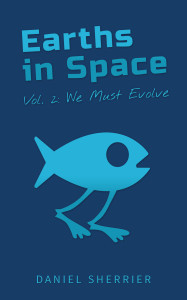 Earths in Space: We Must Evolve
has arrived! The ebook is available, and
so is the paperback edition. It’s not absolutely necessary to read the first book, but I certainly won’t stop you.
Earths in Space: We Must Evolve
has arrived! The ebook is available, and
so is the paperback edition. It’s not absolutely necessary to read the first book, but I certainly won’t stop you.
Let’s have another excerpt, shall we? We shall…
*****
“Good evening, Amena.”
Amena glanced at her before returning her gaze to the moon. “Hey, darling. Sleeping troubles?”
The way she said “darling” with the dropped g … No, it was probably nothing, Quin assured herself. Mere fanciful wishing.
“You could say. My apologies if I’m intruding.”
“You’re intruding on nothing. No worries.”
The “nothing” in this context implied a vacant mind, a person possessed of no deeper thought than her own social standing. But for all her enigmatic nature, Quin was sure of one thing: Amena was the least shallow person she had ever met. “When you look to the sky, what is it you see?”
The question earned Amena’s full attention, and she seemed delighted to respond. “The electromagnetic spectrum. Some of it, anyway. Have you heard of—”
“It sounds intriguing, but I must confess to ignorance on the subject.”
“It’s okay. Word just hasn’t gotten around yet. Anyway, basically, the electromagnetic spectrum is—it has to do with these wavelengths, a whole range of wavelengths.” Her hand swam through the air, bobbing up and down at regular intervals. “The widest could be as big as the universe, potentially, while at the other end, they get as small as the tiniest building blocks of the ittiest bittiest little thing.” Her arms continued to gesture, spreading far apart and swiftly pinching tight together, and then her hands just sort of rolled forward with her speech, as if necessary to siphon off her excess enthusiasm. “Within that, there’s this sliver of a sliver we call visible light. This whole huge spectrum—universe-level huge—and our eyes only pick up a sliver. We’re missing out on a lot.”
Quin looked at the bright moon, wondering what else bounced off it.
Amena’s arms drifted to her sides, and she sounded almost melancholy. “There’s so much more going on than we’ll ever see.”
*****
February 8, 2015
Super Comics: The Amazing Spider-Man #121 & 122 (1973)
New post over at Smash Cut Culture!
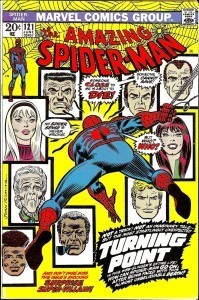 Spoilers for The Amazing Spider-Man 2 ahead!
Spoilers for The Amazing Spider-Man 2 ahead!
Don’t read if you’re still planning on seeing it! Avert your eyes!
The Silver Age of comic books arguably ended with a two-part Spider-Man storyline from 1973 titled “The Night Gwen Stacy Died.”
Written by Gerry Conway and drawn by Gil Kane, the story delivers exactly what the title says—though, to Marvel’s credit, they didn’t reveal the title until the end of the first part. Unlike in today’s spoiler-filled world, Gwen Stacy’s death came as a shock to ‘70s readers.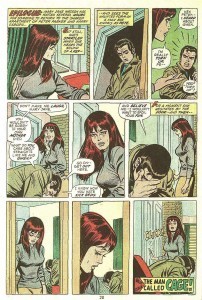
In the comics, Gwen was Peter Parker’s first love, first appearing way back in The Amazing Spider-Man #31 in 1965. Mary Jane Watson, whom Peter would eventually marry, was introduced as a romantic rival in #42. But Mary Jane wound up being the livelier character—a vivacious young woman who initially came across as shallow and flighty but was simply masking her true heart. Gwen, on the other hand, was just a nice girl.
So, to prevent Peter Parker from marrying a one-dimensional woman, the folks at Marvel decided to kill off Gwen.
It was one of, if not the first time the hero failed to save the girl—and not just Spider-Man, but super-heroes in general. Sure, they’d screw up from time to time, especially the Marvel ones, but outside of their origin stories, they seldom or never experienced irrevocable failure.
The rest can be found here.
February 3, 2015
Earths in Space: We Must Evolve excerpt #4
Earths in Space: We Must Evolve
has arrived!  The ebook is available, and so is the paperback edition. It’s not absolutely necessary to read the first book, but I certainly won’t stop you.
The ebook is available, and so is the paperback edition. It’s not absolutely necessary to read the first book, but I certainly won’t stop you.
So…excerpt? Yes, time for another excerpt…
*****
Amena materialized in Renaissance Italy—which wasn’t actually Renaissance Italy, but it sure bore a striking resemblance. It pretty much matched how she pictured it. Smelled even worse, though, but maybe the architecture would stun her nose after it finished stunning her eyeballs. As she clung to the shadow of a tight alley, she wondered if any of these ornate buildings could boast interior artwork on par with that of the Sistine Chapel.
Well. That was a lovely half-second during which she could forget her present company and situation.
“What do you see?” Sharp asked.
“More than you, I’d wager, but I’m sure you’ll tell me the correct answer.”
“Look at the natives.”
Yeah, she got where he was going with this. The street was full of men. From her inconspicuous hideaway, Amena listened to snippets of conversation as they passed. They conducted business, discussed philosophy, debated a new mathematical theorem, and so on. All very interesting, but the tableau felt incomplete.
“Where do you suppose the women are?” Sharp asked. “Perhaps the kitchens? Nurseries? Imagine if you were born here.”
“That is a terrible waste. Yes. That’s a shame—that and so much else. There’s a lot more wrong here than you’d ever notice. These people—the ones alive right now—they’ll never explore outer space. They’ll never even reach the moon. Their descendants will create such wonderful art these folks’ll never get a chance to appreciate. They’ll achieve scientific discoveries that would astound any one of them, that would seem so magical—but these people will never know. Yeah, it stinks that it takes so long to grow a civilization, but the payoff’s amazing. These guys might be too stupid to treat their women as people, but each generation will get a little smarter until that’s corrected.”
“They won’t, because I’m about to kill them.” Sharp tapped his badge. “Location Beta.”
*****
January 29, 2015
Earths in Space: We Must Evolve excerpt #3
 Launch week for
Earths in Space: We Must Evolve
has arrived! The ebook’s preorder pages will magically transform into order pages on Friday, and the paperback edition already went live. It’s not absolutely necessary to read the first book, but I certainly won’t stop you.
Launch week for
Earths in Space: We Must Evolve
has arrived! The ebook’s preorder pages will magically transform into order pages on Friday, and the paperback edition already went live. It’s not absolutely necessary to read the first book, but I certainly won’t stop you.
This latest excerpt allows me to bring up an extra-special point. An uncommon feature of the Earths in Space series is that it stars an asexual leading lady. Asexuality is the least common of sexual orientations. The description applies to maybe 1 percent of the population. But it’s real. Some people simply don’t experience sexual attraction, and that’s fine. To learn more about asexuality, check out the Asexuality Visibility and Education Network, or just Google it.
This sci-fi story is not about asexuality, and it’s not even explicitly stated. Amena’s asexuality is vaguely hinted at in Vol. 1, but it becomes a bit more obvious in Vol. 2, as you’ll see below…
*****
“He actually can get pretty industrious sometimes,” Jem said.
Amena wondered if “industrious” was a euphemism. It didn’t sound like one, but a lot of euphemisms tended to take her by surprise.
That kiss was ingrained in Amena’s mind. It nauseated her on a number of levels, the age difference being a big one, but even worse was the notion that this bright—well, sometimes bright—beautiful and strong girl who was just barely old enough to drink would choose to spend such quality time with a slovenly wealthy man prone to erratic behavior. Jem was no gold digger. Outside of the salary she drew from this work, she never spent any of his money. The two of them just kind of clung to each other for unfathomable reasons. Amena understood precious little about it, but she was pretty darn sure it wasn’t healthy.
“Jem, let’s talk girl-to-girl.”
“I guess we would have to.”
“Huh?” Smirking? Why was Jem smirking at her?
“You can’t really talk woman-to-woman, can you?”
“I—what?”
“I’ve never seen you date anyone. Not once in like a year and a half. When Kaden showed up, I had hope, but he’s obviously in your brother zone. Have you ever had a boyfriend?”
Amena faced forward. “I’ve dated.”
“Anyone more than once?”
“I—can’t we just focus on Pluto for now? I mean…Pluto!”
“That’s what gets you off, a place that’s cold and empty, but you can’t stand the touch of another human being.”
“I’ll have you know I’m a highly accomplished hugger.” Amena reminded herself she did not need to go on defense. “Look, forget about me. The issue at hand here—”
“The issue is I have a heart.”
Amena thought she detected an accusatory tone lurking somewhere beneath those words. “Are you suggesting you’re blazing new territory there?”
“New to you.”
“I have a heart.”
“You’ve got something that pumps blood. People are just these cute little novelties to you.”
“We’re all—every individual is a novelty.”
“You taking a date all the way—now that’d be a novelty.”
“Jem, why am I singled out here?”
“Nice pun.”
“No, no, look. Everyone here, we’re all busy universe-trotters without much in the way of love lives.”
“Mariana goes on dates between trips. They all annoy the hell out of her, but she keeps trying. Sela and Kaden will be getting together any second now. You’re probably oblivious about Gilmore. And then Ballard—well, he’s just obnoxious.”
Amena vetted several potential responses before settling on the most efficient one. “He is. Yes. Ballard is certainly obnoxious.”
A disturbing mischievousness overtook Jem. “Do you think he’s pretty?”
Amena gagged.
Jem continued, “I have to admit he’s a good-looking man. I mean, those arms.”
“Stop.”
“The chiseled jaw. Ohh, that hair. I’d do him. Just once. For all you know, I—”
Amena blurted out, “Whit likes Pluto, too. It’s not just me.” She picked up her pace, leaving behind the source of traumatic mental images. “I got calls to make.”
*****
So, if you’re part of that 1 percent of the population who couldn’t care less about hot steamy romances, I give you…Amena!
January 28, 2015
Do women or men write better?
I never gave much thought to the question, but maybe a helpful infographic will come along and shed some light…
Oh, look. Here’s one, courtesy of your friendly neighborhood grammar checker, Grammarly.
 Honestly, I usually stay away from the battle of the sexes. (I come from a female-dominated family, majored in theatre, and work in an otherwise all-female office. I’d lose.) The above can be a fun statistical experiment, but it ultimately emphasizes generalizations and de-emphasizes the outliers. Lots of men and women are great writers. Lots of men and women are terrible writers. The bottom-line data says 59 percent of men and women believe women write better, which isn’t a huge margin and suggests gender is not a great predictor of a writer’s quality.
Honestly, I usually stay away from the battle of the sexes. (I come from a female-dominated family, majored in theatre, and work in an otherwise all-female office. I’d lose.) The above can be a fun statistical experiment, but it ultimately emphasizes generalizations and de-emphasizes the outliers. Lots of men and women are great writers. Lots of men and women are terrible writers. The bottom-line data says 59 percent of men and women believe women write better, which isn’t a huge margin and suggests gender is not a great predictor of a writer’s quality.
The data on sentences did jump out at me, however. Over 75 percent of women are more likely to write long, descriptive sentences vs. about 34 percent of men. That’s a statistically significant difference, and it backs up a trend in my dialogue. My female characters tend to be more verbose or prone to rambling, whereas my male characters use fewer words. Just compare Serissa and Rip in RIP. But there are exceptions, like the terse Mariana in Earths in Space. Don’t want to neglect the outliers.
I love writing those chatty women, probably because I’m not at all chatty. It’s a nice change of pace.
I don’t know if women or men are better writers. I don’t think the question matters all that much. But one thing I do know—men in general can do a better job of writing female characters.
Trust me, guys. It’s fun. And it’s not as hard as you might think, because you’re still just writing people…just potentially chattier people who are more likely to write long, descriptive sentences (but not necessarily!).
January 27, 2015
Earths in Space: We Must Evolve excerpt #2
Launch week for Earths in Space: We Must Evolve has arrived!  The ebook’s preorder pages will magically transform into order pages on Friday, and the paperback edition already went live. It’s not absolutely necessary to read the first book, but I certainly won’t stop you. The following excerpt spoils nothing about Vol. 1.
The ebook’s preorder pages will magically transform into order pages on Friday, and the paperback edition already went live. It’s not absolutely necessary to read the first book, but I certainly won’t stop you. The following excerpt spoils nothing about Vol. 1.
*****
The vice president destroyed civilization, but he didn’t mean to. He simply neglected to seal his containment suit properly. Oh, and the whole initiative kind of was his idea in the first place.
Zanna Fuentes was his deputy press secretary, but now she had a new job—ambassador to the next Earth.
She stared at the massive vessel that would bring her there, along with nearly five hundred other survivors. It sat in the cavernous bunker beneath the Department of Scientific Advancement, where a bunch of paranoids had constructed it in secret a decade earlier. The body was an obese cylinder capped by hemispheres on both ends. The technicians dotted the grainy yellow hull as little more than specks from Zanna’s vantage point in the observation room.
That thing was going to be her home for many thousands of years. It was her future, her entire civilization’s future.
A military official joined her up there, his hands clasped behind his back and his posture too perfect, as if he had practiced for innumerable hours until his neck and shoulders froze in that position. He faced the same direction she did, though he focused on the recently refortified glass rather than through it, to inspect it for cracks. It was clean.
Content to see no one else had tried to take advantage of the quarter-mile drop, he asked, “How are you holding up?”
Zanna brushed aside the thick bangs to touch her forehead, just to make sure. “No symptoms yet.” Her slightly labored breathing concerned her, but that may have resulted from her professional skirt and blouse—too constrictive. Not helping. Thousands of years, in these uncomfortable clothes. What had she been thinking? At least her petite frame would reduce the risk of a claustrophobic reaction. Her youth and diminutive nature often came in handy in her line of work, contributing to an air of innocence that fostered people’s trust.
“I meant otherwise…with all the loss.”
Zanna watched the distant technicians conduct their final inspections. She hoped they hadn’t messed anything up, but she had no way of knowing.
“I’m just trying to focus on the future,” she said, becoming aware of her clammy hands. “What else can I do? If I—no, we’re going to have a new life on a new Earth. That’s all.”
How primitive was that Earth compared to their own? At least they were giving it plenty of time to catch up.
Zanna realized she didn’t know the man’s name, and she wondered if she should bother asking. “How do we know this ship won’t miss?” she asked instead. “If everything’s in constant motion and we’re all asleep, we could crash into an asteroid or end up in a sun and—”
“Our launch schedule takes the Earth’s orbit into account, as well as the other planets in its solar system. By the time we reach the inner asteroid belt, pilots will be reawakened. It’s all been mapped out to the microsecond. No worries, ma’am.”
“No, I just—I know we’ve got more than five hundred people still out there…”
“We’re taking care of those details. Are you comfortable with your assignment?”
“Of course. I’m happy to do my part.”
“Good, because we’re running low on diplomats.”
The fat vessel gave Zanna a chill, which she found appropriate. Thousands of years confined within. Tens of thousands.
“Is this all really happening?” she asked. “Have I just gone crazy?”
“I’m afraid you’re perfectly sane, ma’am. The dead are rising, and they’re hungry.”
She pried her gaze away from the vessel and faced him. “I’m sorry—I never caught your name.”
He shook her hand. A nice firm grip. A ray of friendliness slipped through his stoic demeanor. “Major Bob Moran.”
Zanna smiled, which required more effort than it used to. “Nice to meet you, Major Moran. I’m sure we’ve got a great life ahead of us on our new Earth.”
*****
Don’t forget…Preordering is fun.
January 25, 2015
Earths in Space: We Must Evolve excerpt #1
 Launch week for Earths in Space: We Must Evolve has arrived! The ebook’s preorder pages will magically transform into order pages on Friday, and the paperback edition just went live. It’s not absolutely necessary to read the first book, but I certainly won’t stop you.
Launch week for Earths in Space: We Must Evolve has arrived! The ebook’s preorder pages will magically transform into order pages on Friday, and the paperback edition just went live. It’s not absolutely necessary to read the first book, but I certainly won’t stop you.
So let’s kick things off with an excerpt. Then, for an even grander time, I’ll post other excerpts throughout the week.
Here we go, but be warned — this snippet includes some spoilers for Vol. 1…
*****
Evolution was a real thing. Amena Wharry knew this for a fact. She had witnessed it in action on an Earth that no longer existed. That giant swimming eyeball was forever etched in her memory. She saw it, felt its slimy tentacles as they ensnared her, and she had regrettably killed the poor thing, though she never learned what species it had descended from. Did a race of giant eyeballs already exist deep within her Earth’s oceans? But those snakes were clearly evolved, the way they stretched their mouths unnaturally wide. Then again, that could’ve been a species of snake that had remained hidden in rainforests or was driven to extinction long ago, and those little dinosaurs might never have gone extinct over there in the first place…
The slender redhead swiped her paintbrush across a side wall in The Patrick Henry’s control room. The dull metal got old on day one, and she finally found time to rectify the horrid situation—rectify it as much as her limited artistic talents allowed. Intricate murals were beyond her abilities, and she didn’t have that much time anyway, but she could slap assorted streaks of color up and down the walls. She preferred detailed images that merited close inspection—the sort of work she’d find in art museums’ historical wings—but she settled on abstract expressionism. It was color. It broke the monotony, stimulated the brain even.
Surely people were capable of evolution. If those animals could evolve on that ancient Earth, then humanity likely had the same potential. They just never got the chance there. That civilization died young, lasted for a teensy fraction of the planet’s ten billion years. But maybe on some other Earth…
*****
Preordering is fun, by the way…
January 17, 2015
Hermione could’ve been a great lead in ‘Harry Potter’
Buzzfeed posted an article titled “If Hermione Were The Main Character In Harry Potter.”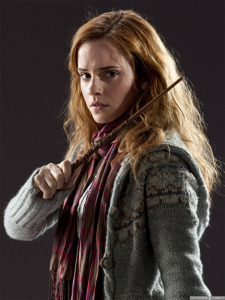
When I saw the headline, I was expecting a story about a muggle-born witch rising out of humble beginnings to achieve greatness no one ever would have expected of her. Maybe Hermione would even going so far as to defy the prophecies surrounding “The Boy Who Lived” that everyone around her was taking so much stock in, and she’d be the one to defeat Voldemort, not Harry, because she built herself into a person capable of doing so, to heck with whatever was preordained when they were babies.
That could be a great self-made person story — and it would serve the cause of gender equality better than that Buzzfeed article about Hermione vs. The Patriarchy (though I don’t recall the actual Harry Potter series being sexist — after all, it gave us Hermione).
I get what the article is trying to do, but if that were an actual series, it would read like the feminist equivalent of Atlas Shrugged. On-the-nose preaching just doesn’t work as entertainment, and preaching doesn’t change minds. Show, don’t tell.
January 14, 2015
Super Comics: Uncanny X-Men #172 & 173
New post over at Smash Cut Culture!
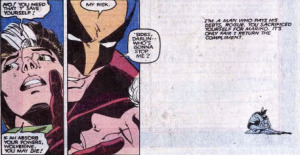 Let’s go back to the early days of the super-hero movie trend, to the first X-Men movie from 2000. (Spoilers ahead, but it’s been nearly 15 years.)
Let’s go back to the early days of the super-hero movie trend, to the first X-Men movie from 2000. (Spoilers ahead, but it’s been nearly 15 years.)
That movie featured Wolverine and Rogue as our viewpoints characters, and it built a friendship between, which culminated in Wolverine—at great risk to his own health—allowing Rogue to borrow his healing ability so she could recover from life-threatening injuries. I can’t find that scene on YouTube, but this is the music that plays during the moment.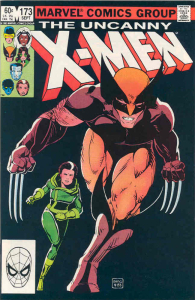
I’m guessing that scene was inspired by the events ofUncanny X-Men #172 and 173 from 1983, which were written by main X-architect Chris Claremont and drawn by Paul Smith. This pair of issues serves a double purpose—to follow up the excellent Wolverine miniseries Claremont had just completed with artist Frank Miller, and to establish Rogue as a bona fide X-Woman. By the way, that Wolverine miniseries influenced aspects of The Wolverine movie from 2013, but that’d be a whole other article.
Rogue only joined the team in #171, and before that, she was primarily known as the bad guy who stole Ms. Marvel’s powers and memories—in an Avengers comic, since no competing studios were keeping Marvel’s mutant and non-mutant characters apart. Ms. Marvel was a friend of the X-Men and of Wolverine in particular. In today’s comics, Ms. Marvel has become Captain Marvel and is more popular than ever, and she’s set to star in her own film in 2018. But the ‘80s were not kind to her.



